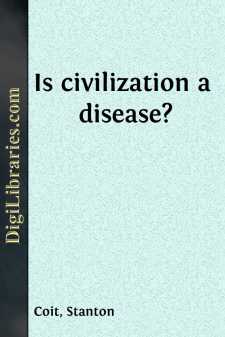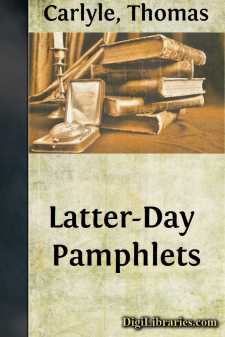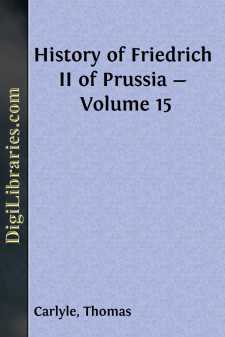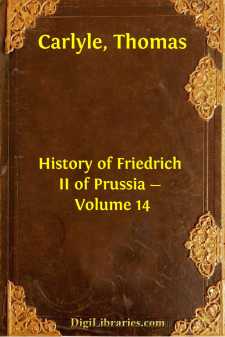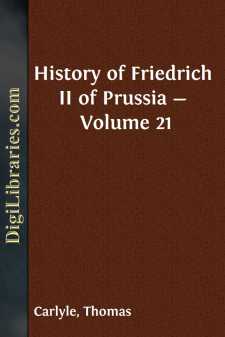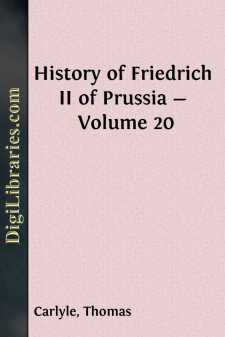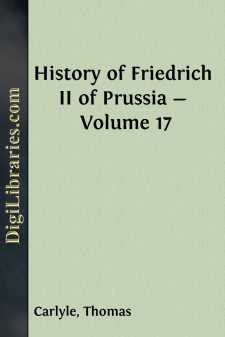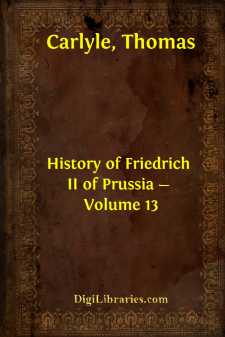History
- Africa 30
- Americas (North Central South West Indies) 50
- Ancient 68
- Asia 58
- Australia & New Zealand 8
- Canada 41
- Caribbean & West Indies 1
- Civilization 20
- Eastern Europe 12
- Europe 310
- Expeditions & Discoveries 60
- General 77
- Historical Geography 1
- Jewish 9
- Latin America 3
- Medieval 8
- Middle East 13
- Military 248
- Revolutionary 8
- Study & Teaching 5
- United States 353
- Western Europe 56
- World 13
History Books
Sort by:
by:
Stanton Coit
I. TRADE TYPICAL OF CIVILIZATION In choosing "The Morals of Trade" as the general title of the Weinstock Lectureship, I am informed that its founder meant the word "Trade" to be understood in its comprehensive sense, as commensurate with our whole system of socialized wealth—at least, upon the present occasion I shall interpret it in this broad way. I shall furthermore ask you to...
more...
by:
Thomas Carlyle
NO. I. THE PRESENT TIME. [February 1, 1850.] The Present Time, youngest-born of Eternity, child and heir of all the Past Times with their good and evil, and parent of all the Future, is ever a "New Era" to the thinking man; and comes with new questions and significance, however commonplace it look: to know it, and what it bids us do, is ever the sum of knowledge for all of us. This new Day,...
more...
by:
Thomas Carlyle
CHAPTER I. MIDAS. The condition of England, on which many pamphlets are now in the course of publication, and many thoughts unpublished are going on in every reflective head, is justly regarded as one of the most ominous, and withal one of the strangest, ever seen in this world. England is full of wealth, of multifarious produce, supply for human want in every kind; yet England is dying of inanition....
more...
by:
Thomas Carlyle
Chapter I.—PRELIMINARY: HOW THE MOMENT ARRIVED. Battle being once seen to be inevitable, it was Friedrich's plan not to wait for it, but to give it. Thanks to Friedrich Wilhelm and himself, there is no Army, nor ever was any, in such continual preparation. Military people say, "Some Countries take six months, some twelve, to get in motion for war: but in three weeks Prussia can be across the...
more...
by:
Thomas Carlyle
Chapter I.—FRIEDRICH RESUMES HIS PEACEABLE PURSUITS. Friedrich's own Peace being made on such terms, his wish and hope was, that it might soon be followed by a general European one; that, the live-coal, which had kindled this War, being quenched, the War itself might go out. Silesia is his; farther interest in the Controversy, except that it would end itself in some fair manner, he has none....
more...
by:
Thomas Carlyle
Chapter I.—PREFATORY. The Twelve Hercules-labors of this King have ended here; what was required of him in World-History is accomplished. There remain to Friedrich Twenty-three Years more of Life, which to Prussian History are as full of importance as ever; but do not essentially concern European History, Europe having gone the road we now see it in. On the grand World-Theatre the curtain has fallen...
more...
[I saw that money is the cause of suffering and vice among the people, and that, if I desired to help people, the first thing that was required of me was not to create those unfortunates whom I wished to assist. I came to the conclusion that the man who does not love vice and the suffering of the people should not make use of money, thus presenting an inducement to extortion from the poor, by forcing...
more...
by:
Thomas Carlyle
Chapter I.—FIFTH CAMPAIGN OPENS. There were yet, to the world's surprise and regret, Three Campaigns of this War; but the Campaign 1760, which we are now upon, was what produced or rendered possible the other two;—was the crisis of them, and is now the only one that can require much narrative from us here. Ill-luck, which, Friedrich complains, had followed him like his shadow, in a strange and...
more...
by:
Thomas Carlyle
Chapter I.—WHAT FRIEDRICH HAD READ IN THE MENZEL DOCUMENTS. The ill-informed world, entirely unaware of what Friedrich had been studying and ascertaining, to his bitter sorrow, for four years past, was extremely astonished at the part he took in those French-English troubles; extremely provoked at his breaking out again into a Third Silesian War, greater than all the others, and kindling all Europe...
more...
by:
Thomas Carlyle
Chapter I. — BRITANNIC MAJESTY AS PALADIN OF THE PRAGMATIC. Part, is now perhaps conceivable to readers. But as to the Second, the Germanic or Pragmatic Part,—articulate History, after much consideration, is content to renounce attempting these; feels that these will remain forever inconceivable to mankind in the now altered times. So small a gentleman; and he feels, dismally though with heroism,...
more...


